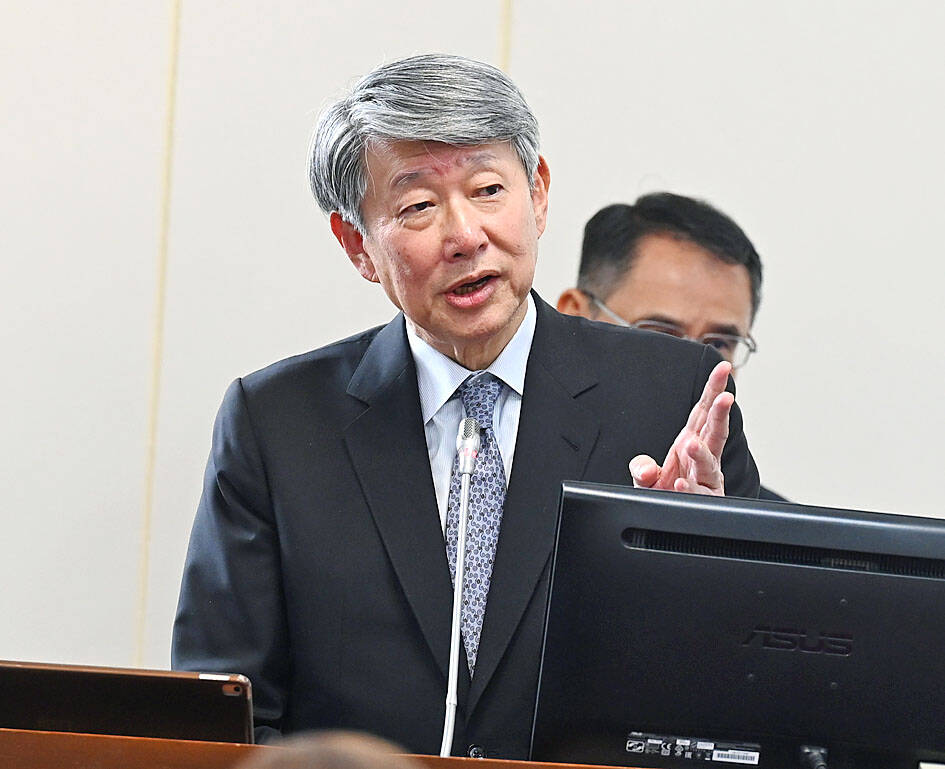Taiwan has reached an agreement with industry giants to recruit foreign experts in artificial intelligence (AI) to address a human resources issue in the sector, Minister of Economic Affairs J.W. Kuo (郭智輝) told a meeting of the legislature’s Economics Committee in Taipei yesterday.
Democratic Progressive Party (DPP) Legislator Chiu Yi-ying (邱議瑩) asked officials to detail the government’s plan to create a skilled workforce big enough to meet industry demand.
The nation does not have enough workers with the skills the AI sector needs, especially those who train or tune large language models, Kuo said during a question-and-answer session.

Photo: Wang Yi-sung, Taipei Times
Taiwan and industry giants, including Nvidia, discussed the matter and reached an agreement that guarantees Nvidia that at least half of its new hires for such roles would be foreign nationals, he said.
Under the deal, Nvidia is to employ 500 foreign nationals out of its planned workforce of 1,000 engineers to be tasked with chip, system, software and AI design, he said.
Deputy Minister of Education Yeh Ping-cheng (葉丙成) said that creating a workforce for the AI industry has been the ministry’s priority for many years.
The government created 13 research academies, five of which are focused on AI, with 972 people graduating with a master’s or doctoral degrees in AI annually, he said.
Regarding secondary education, Yeh said his ministry plans to unveil the digital education guidelines 3.0 in October.
The new version of the educators’ manual, which would involve principals, teachers and parents in teaching children about AI and information technology, could be implemented as soon as the second semester of this academic year, he said.
The Ministry of Education is considering creating online-based courses for technical subjects, including AI, that high schools might not be equipped to teach, Yeh said.
The plan, dubbed “central kitchen,” would be implemented with the assistance of teachers specializing in information technology education, he said.
Earlier, Chiu said that Taiwan’s leadership in the tech industry rests on advanced semiconductor and AI server manufacturing, not chip design or generative AI.
This deficiency is due to the lack of workers with skills relevant to AI development, Chiu said, adding that the government’s AI plans require within four years a 200,000-strong workforce trained in the appropriate fields.
The Ministry of Economic Affairs should clarify its plan to furnish the projected number of highly skilled workers needed to develop an AI industry, she said.
The Ministry of Education should address its policy on secondary and higher education toward preparing the next generation of Taiwanese for a digital and tech-centric economy, she added.
South Korea is expected to roll out digital technology textbooks for high-school students next year, she said.

CALL FOR SUPPORT: President William Lai called on lawmakers across party lines to ensure the livelihood of Taiwanese and that national security is protected President William Lai (賴清德) yesterday called for bipartisan support for Taiwan’s investment in self-defense capabilities at the christening and launch of two coast guard vessels at CSBC Corp, Taiwan’s (台灣國際造船) shipyard in Kaohsiung. The Taipei (台北) is the fourth and final ship of the Chiayi-class offshore patrol vessels, and the Siraya (西拉雅) is the Coast Guard Administration’s (CGA) first-ever ocean patrol vessel, the government said. The Taipei is the fourth and final ship of the Chiayi-class offshore patrol vessels with a displacement of about 4,000 tonnes, Lai said. This ship class was ordered as a result of former president Tsai Ing-wen’s (蔡英文) 2018

‘SECRETS’: While saying China would not attack during his presidency, Donald Trump declined to say how Washington would respond if Beijing were to take military action US President Donald Trump said that China would not take military action against Taiwan while he is president, as the Chinese leaders “know the consequences.” Trump made the statement during an interview on CBS’ 60 Minutes program that aired on Sunday, a few days after his meeting with Chinese President Xi Jinping (習近平) in South Korea. “He [Xi] has openly said, and his people have openly said at meetings, ‘we would never do anything while President Trump is president,’ because they know the consequences,” Trump said in the interview. However, he repeatedly declined to say exactly how Washington would respond in

WARFARE: All sectors of society should recognize, unite, and collectively resist and condemn Beijing’s cross-border suppression, MAC Minister Chiu Chui-cheng said The number of Taiwanese detained because of legal affairs by Chinese authorities has tripled this year, as Beijing intensified its intimidation and division of Taiwanese by combining lawfare and cognitive warfare, the Mainland Affairs Council (MAC) said yesterday. MAC Minister Chiu Chui-cheng (邱垂正) made the statement in response to questions by Democratic Progressive Party (DPP) Legislator Puma Shen (沈柏洋) about the government’s response to counter Chinese public opinion warfare, lawfare and psychological warfare. Shen said he is also being investigated by China for promoting “Taiwanese independence.” He was referring to a report published on Tuesday last week by China’s state-run Xinhua news agency,

‘ADDITIONAL CONDITION’: Taiwan will work with like-minded countries to protect its right to participate in next year’s meeting, the foreign ministry said The US will “continue to press China for security arrangements and protocols that safeguard all participants when attending APEC meetings in China,” a US Department of State spokesperson said yesterday, after Beijing suggested that members must adhere to its “one China principle” to participate. “The United States insists on the full and equal participation of all APEC member economies — including Taiwan — consistent with APEC’s guidelines, rules and established practice, as affirmed by China in its offer to host in 2026,” the unnamed spokesperson said in response to media queries about China putting a “one China” principle condition on Taiwan’s